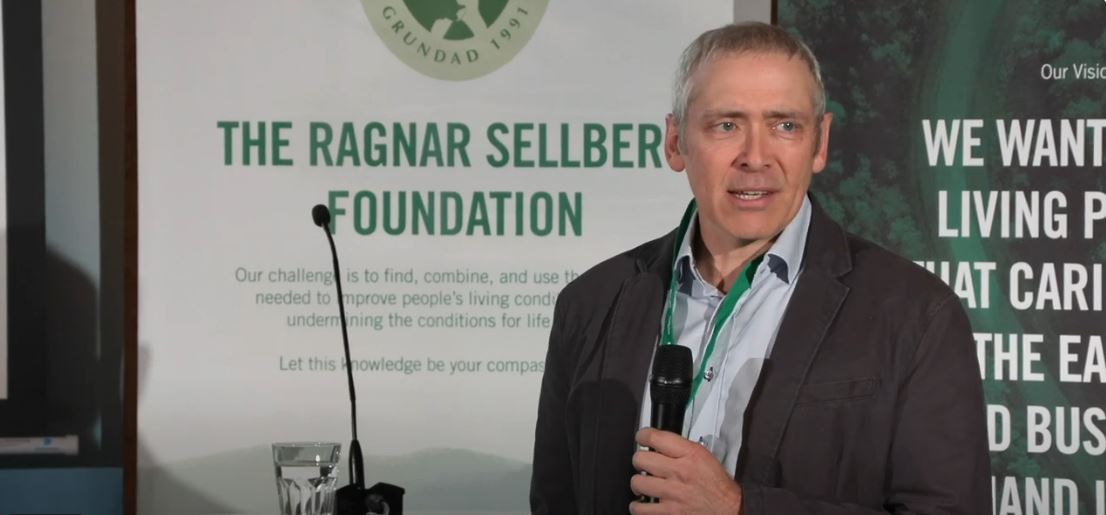How many new chemicals can the planet handle?
A recent seminar on new technologies and trends around detoxification addressed the effects of chemical pollution. Keynote speaker Professor Matthew MacLeod shared his research on the category of pollutants that have a poorly reversible global impact, including a special look at plastics.
28 Jan 2025As a chemist and modeller at Stockholm University, MacLeod investigates how exposure to pollution impacts both people and the environment. His presentation “Planetary limits for chemical pollution and novel entities” kicked off Framtidsdagen (Future Day) 2024, an annual seminar hosted by Ragn-Sells and the Ragnar Sellberg Foundation to discuss the latest innovations in recycling and circularity. The 19th instalment of the event was organised around the theme Detoxification – the key to circular material flows.
In his talk, MacLeod explained his work on novel entities, defined as new substances that people have introduced into the environment on a scale that could disrupt the Earth system. This includes things like chemical pollutants and material contaminants. While their specific impact may not be known, the idea is that any negative effects they create would be virtually impossible to reverse once discovered, due to the sheer volume of these substances.
 Professor Matthew MacLeod at the seminar Framtidsdagen (Future Day).
Professor Matthew MacLeod at the seminar Framtidsdagen (Future Day).
When a planetary boundary is exceeded
Novel entities represent one of the nine Planetary Boundaries, or the limits for sustaining a liveable planet. In 2020, after many years of helping define novel entities as a concept, MacLeod joined a working group at Stockholm Resilience Centre tasked with quantifying their planetary limit.
They ultimately determined that a precautionary approach was best, considering the boundary to have already been exceeded.
– We proposed that the boundary is exceeded whenever the production and release of novel entities outstrips our capacity to understand them. And this is because we have this problem of ignorance: we don't necessarily know what their effects are. They're truly novel things that we're putting in the environment, said MacLeod.
He recounted that the decision came down to the exponential increase in chemical pollution, alongside the reality that the number of commercially available chemical substances had risen to 350,000.
16,000 reasons to stop producing new plastic
Tying his research to detoxification and material flows, MacLeod stressed the need to simplify the mix of chemicals used in manufacturing.
– I think the most effective way to detoxify is not to toxify in the first place, he said.
He also considers it crucial to find alternatives to any chemicals that hold a critical role in society. One example is plastic, a focus of his research for the past several years. That material alone involves over 16,000 different chemicals, up to 25% of which fits the European Chemicals Agency’s criteria for having hazardous properties. In 2021, MacLeod co-authored a paper identifying plastic pollution as a novel threat.
– Because plastic pollution is globally distributed, it's poorly reversible. Not only because it's persistent, but also because we are addicted to plastic in the same way we're addicted to carbon dioxide emissions, he said.
With final negotiations underway for the United Nations Environment Programme’s Global Plastics Treaty, MacLeod believes that the agreement should include a cap on the production of virgin plastic. He pointed to a central issue: because producing new plastic is far cheaper than recycling, plastic waste has no commercial value. A production cap would mean an economic incentive to recycle, encouraging circularity.
“The challenge is great, but we can do something”
With more and more coming to light about the effects of chemical and material pollutants, MacLeod continues his work identifying the highest-priority problems. He remains especially interested in plastics as a key potential example of novel entities.
Amid that research, he also focuses on science communication to educate the public about the challenges humankind is facing. His preferred tool? The Planetary Boundaries framework itself.
– I really think the biggest value of this Planetary Boundaries concept is communication and interest awareness because it's something that you can really understand. You look at this picture and see that we have these problems in all these different dimensions. The challenge is great, but I think we can do something, he said.
Watch the full presentation with Professor Matthew MacLeod from Framtidsdagen (Future Day):
